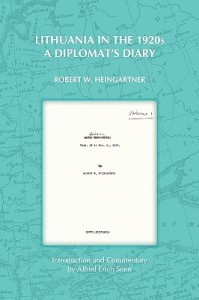A Diplomat’s Diary – Part 1
Lithuanian in the 1920s
Robert W. Heingartner
If Jonas Budrys’s memoir of his directorship of counterintelligence in the 1920s forms the foreground of my next novel, the background is richly fleshed out by this quirky and insightful diary from the American consul to Kaunas from 1926-1928.
Heingartner was a scrupulous diarist with an eye for detail in the new country, which he called a “provisional” country because he doubted whether it could succeed. A cultured American who had been consul in Vienna for many years, he was disappointed by the “hardship” posting in a town with no coffee houses, hideous streets, and a single awful hotel where all the government receptions were held.
He said the houses were desolate, the people poor, and the roads disgraceful, although it hardly mattered because there were only 570 cars in the country of three million. However, there were many cows and many children.
Clearly disappointed not to be in Vienna any longer, he nevertheless comes around to reconciling himself to the place. He describes a lunch buffet with a Lithuanian minister that includes vodka, soup, boiled salmon, partridges, vegetables, and ices. At least he ate well.
He provides exquisite detail for a novelist searching for sources – for example, all houses were required by law to keep rain barrels to help fight fires. A Jewish painter would not work on the Sabbath but he would oversee and assistant who did. There is some casual anti-Semitism in his diary, but also interesting observations. Jews keep to their own restaurants and a Jewish girl will not walk on a street with a Christian for fear of reprimand from her people. Christians and Jews seem to belong to two solitudes, or rather, two of many solitudes, because Polish speakers and Orthodox Russians form separate coteries as well.
Heingartner comes to measure the quality of receptions by the amount of caviar, and French wines, champagne, and cognacs (krupnikas and vodka are always available). Of course, at the time, the USA was under prohibition, so the alcohol availability was welcome, although he came to moderate his intake because he found the locals drank far too much.
I’ll post a few more of his observations later, but I want to mention that Heingartner is practically a Dickensian character. He suffers from acute sinusitis, and so his nose is one of his primary concerns. His search for an appropriate nose doctor consumes him, and eventually leads him to go out of the country for a suitable one.
And he occasionally writes sentences worthy of a novelist. The city of Kaunas lies at the confluence of two rivers, so her refers to the place in winter as “A bottle of champagne on ice.”
A lovely memoir of her grandfather was told by Nancy Heingartner at the recent AABS conference in Chicago.
More later.
